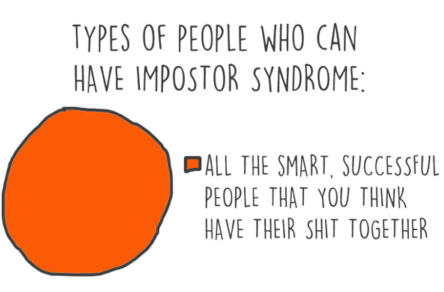
If you suffer from a feeling that you’re not good enough and have a tendency towards perfectionism then you are entirely normal since most people feel this way. Feelings of insecurity are particularly common when people are promoted to a leadership position.
However, if your mental health is affected and your career is impeded then it’s time to step back and take action to create a more helpful way of thinking and feeling.
The term used to describe this condition is ‘imposter syndrome’. The official definition describes it as “‘high-achieving individuals who are marked by an inability to internalise their accomplishments and a persistent fear of being exposed as a ‘fraud’.”
How do you identify and manage imposter syndrome?
These are some indications of a need to take action:
Fear of taking risks is one of the most damaging effects of this syndrome. The feeling of being a fraud can affect quality of thinking and problem solving, willingness to innovate and ability to manage due to having higher expectations of others so as to protect against appearing personally deficient.
This neurotic imposture causes many talented, hardworking, and capable leaders who have achieved great things to believe that they don’t deserve their success. For example, Sheryl Sandberg, Facebook COO, declared in her book ‘Lean In: Women, Work, and the Will to Lead’ that she could sit in a room and believe that people saw her as a fraud, that she was not good enough to be there. Neurotic impostors can be found at all levels of an organization.
The following are actions which you can take to change the way you think about yourself:
Remember that our fears never leave us entirely and they can surface at any time, but we can learn to manage imposter syndrome more effectively rather than being driven by them. Knowing this is understanding what it means to be human and fallible.
Whilst practising the actions above will help, working one to one with a trusted other, such as a coach, is a much more effective way of expediting the changes you want to obtain, whilst making the process easier and more enjoyable.
Nick Harris is an ICF Master Certified executive coach with 3,500 hours of one to one coaching experience. He specialises in supporting people to maximise their personal and professional performance, whether focused around business, career or life coaching. He has guided hundreds of clients through difficult transitions and challenges in order to achieve the outcomes and fulfilment that they want. He aims to make the coaching process enjoyable and fun whilst creating a context of rich personal learning, to enable his clients to improve their confidence and re-motivate themselves to identify and achieve their personal and career goals.
Image by 23 Code Street from Medium
Read more blogs about Emotional Intelligence – Feelings matter; how well do you connect with yours?

+ 3 more
Coach with extensive corporate experience supporting people facing change and overcoming challenge.